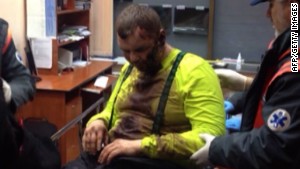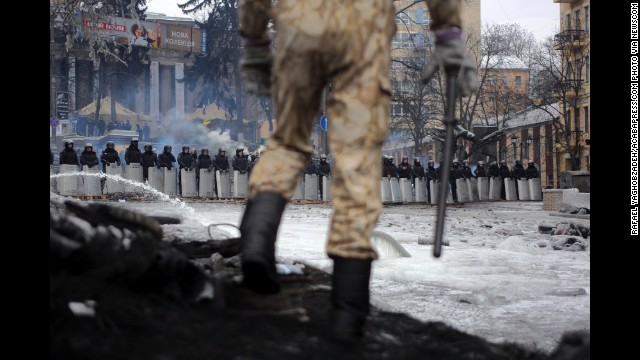Stop the ultimatums, Russia tells Ukraine protesters
February 3, 2014 -- Updated 1324 GMT (2124 HKT)
STORY HIGHLIGHTS
- Ukrainian President returns to his desk after a four-day sick leave
- Russia: "We hope the opposition in Ukraine will renounce threats and ultimatums"
- Thousands of demonstrators remain on the streets of central Kiev
- The opposition wants more concessions from the government
President Viktor
Yanukovych, who went on sick leave last Thursday for "acute respiratory
disease," is seeking a way out of a deepening political crisis that has
paralyzed Kiev, the capital.
Thousands of
anti-government demonstrators have packed Kiev's Independence Square
since November, underscoring tensions in a country split between
pro-European regions in the west and a more Russia-oriented east.
Last week, in the first
concessions made by the government, the Prime Minister and Cabinet
resigned, a controversial anti-protest law was repealed, and Yanukovych
signed off on a contested amnesty bill for anti-government protesters.
 What Putin thinks of Ukraine protests
What Putin thinks of Ukraine protests
 Protest leader says he was 'crucified'
Protest leader says he was 'crucified'
 Activist reappears, beaten and bloodied
Activist reappears, beaten and bloodied
But opposition leaders, who have received backing from the U.S. and EU governments, are pressing for more concessions.
In a statement Monday,
Russia's Foreign Ministry told protesters who have set up tents and
barricades in the central Independence Square to halt their "provocative
steps."
It said one protest
leader's calls for street patrols and the blocking of public buildings
"contradicted statements about the opposition's commitment to the
democratic and European values."
"We hope the opposition
in Ukraine will renounce threats and ultimatums and activate a dialogue
with the government to solve the severe crisis," the ministry said.
Special session in Parliament
Yanukovych's online
press service said Sunday that he was now feeling "good" after treatment
and his condition had been assessed as "satisfactory." It said he would
return to his desk Monday.
The government's
attempts to crack down on the protests appear only to have strengthened
the opposition's resolve. Violent confrontations flared after a sweeping
anti-protest law was signed two weeks ago, followed by an uneasy
standoff on the streets as the battle in the political arena has heated
up.
Yanukovych has resisted calls for him to step down and defended the government's handling of the political crisis.
However, opposition
parties continue to call for constitutional reforms to shift power away
from the President and say a new amnesty bill -- which comes into force
only if protesters vacate seized government buildings and unblock roads
and squares -- is unacceptable.
A special parliamentary session is scheduled for Tuesday.
Activist treated in Lithuania
Deadly clashes last
month were an escalation of weeks of largely peaceful public protests
prompted by Yanukovych's decision in November to spurn a planned trade
deal with the European Union and favor Russia instead.
He and Russian President
Vladimir Putin agreed on a $15 billion deal for Russia to buy Ukrainian
debt and slash the price of natural gas.
The violence on the
streets has raised alarm among Ukraine's neighbors and Western
governments, who have been calling for a peaceful resolution to the
unrest.
Western leaders last
week also voiced growing concern about reports of the kidnapping and
torture of opposition activists in the country.
One, the visibly
battered Dmytro Bulatov, reappeared Thursday, more than a week after he
went missing. He told reporters he'd been kidnapped and tortured by his
captors -- who, he said, "crucified me" by piercing his hands -- before
they dumped him in a forest.
EU foreign policy chief
Catherine Ashton and White House press secretary Jay Carney condemned
his cruel treatment. Ukraine's Interior Ministry has said it is
investigating what happened to him.
Bulatov on Sunday flew to Lithuania for medical treatment, protest leaders said.
 A protester stands on top of
barricades in Ukraine's capital of Kiev on Tuesday, January 28.
Long-running demonstrations escalated into violent confrontations this
month, with police and protesters fighting in Kiev's icy streets.
A protester stands on top of
barricades in Ukraine's capital of Kiev on Tuesday, January 28.
Long-running demonstrations escalated into violent confrontations this
month, with police and protesters fighting in Kiev's icy streets.

0 التعليقات:
إرسال تعليق